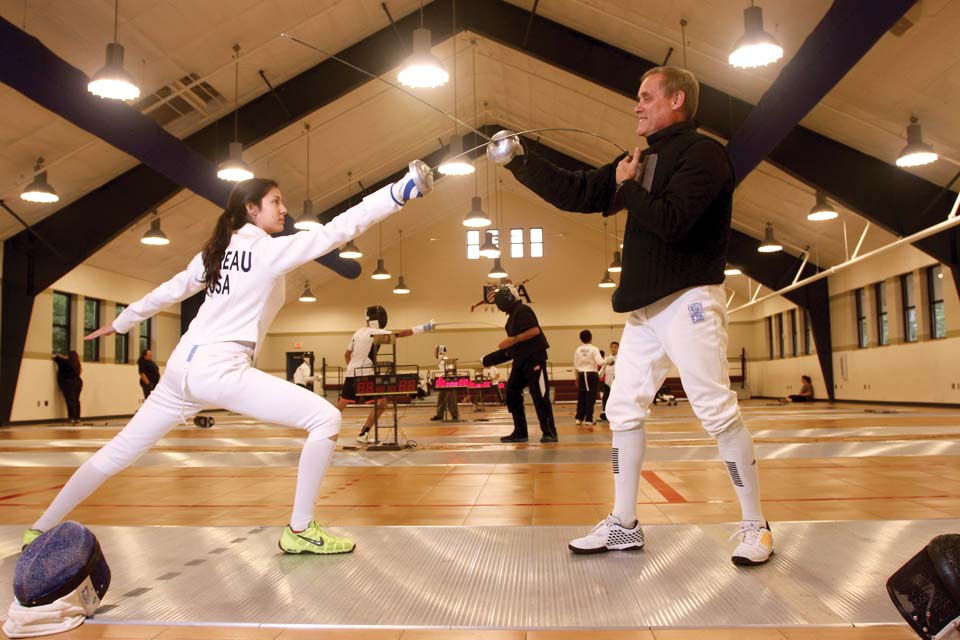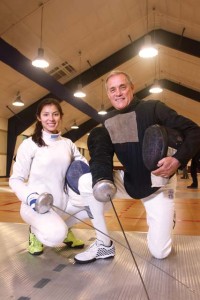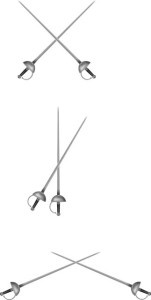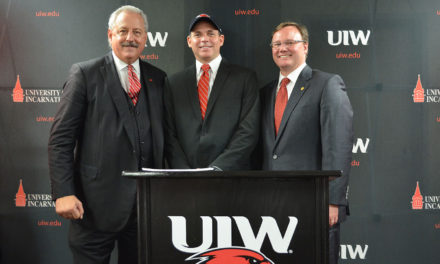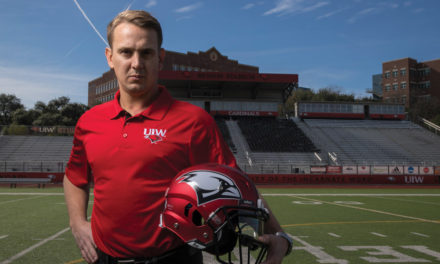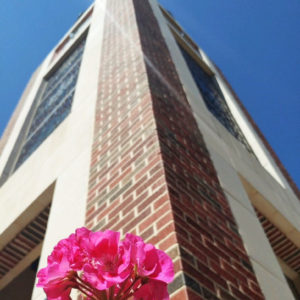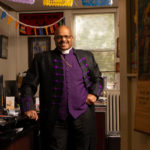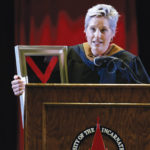By Raúl A. Flores
Fencing may not have the glory of gridiron. But that is not stopping the University of the Incarnate Word (UIW) from shouting “En Garde!” atop the roof of a state-of-the-art facility to announce the launch of an NCAA Division I fencing program.
Sparked by the vision of Dr. Timothy Henrich, longtime UIW professor of sports management and kinesiology and swimming coach who passed away last year, the Cardinals athletic program is banking on a sport that recently-hired Head Coach John Moreau calls “chess on your feet.” Moreau believes the fencing program is the first Division I startup in the country in more than three decades.
UIW is poised to take the stage in the fall and Moreau has been tasked with recruiting fencers to fill his squad, although many have already committed to other schools for the 2015-16 school year. Moreau said he will need at least five men and five women fencers to field a team, but envisions a team that one day is up to 40 members strong.
His first committed fencer is his daughter, Monet Moreau, who is a member of the UIW swim team and was a member of the 2014 USA Youth World Modern Pentathlon Team that competed in Budapest, Hungary.
“I’m a little behind the eight-ball because most kids know where they want to go,” Coach Moreau said. “We will field a small team to get started and build from there.”
UIW showed its commitment to the program when selecting Moreau to lead the charge. He brings a resumé filled with a career of accolades and awards that includes appearances at the 1984 and 1988 Summer Olympics as a member of the U.S. fencing team. Moreau won bronze medals at the 2002 and 2005 Veteran Fencing World Championships. And in 2003 at age 52, he became the oldest champion at the U.S. National Championships in epée, one of the three weapons used in competitive fencing.
“That’s all in the past: it doesn’t mean anything anymore,” Moreau said with a balance of modesty and pride in his accomplishments. “What excites me is the challenge of starting this from scratch. I could go to an established program. But the opportunity to make history here is just simply too exciting.”
Moreau points to the leadership of the university and the drive of the late Henrich, who passed away just days after Moreau was hired.
“I was amazed at what I saw here,” Moreau said. “(President Lou) Agnese wants to make UIW unique. He’s such an advanced thinker. Too much stuff is often reactionary. But he is a visionary who wants to make students’ lives more complete.”
But Moreau said so much of the credit for the fencing program has to go to Henrich, who was instrumental in securing the grant for the $4 million fencing facility, the Henrich Center for Fencing and International Sports located on the campus of St. Anthony Catholic High School, not far from UIW’s main campus.
His dream was that a fencing center in San Antonio would serve to cultivate athletes that some day could compete in fencing or pentathlon at the U.S. Olympic Training Center in Colorado Springs, Colo.
The Alamo City is no stranger to the sport, serving as home to the U.S. Modern Pentathlon training center until it moved to Colorado in the 1990s. More recently, even without a local competing school, the NCAA National Fencing Championship Tournament was held at the Freeman Coliseum in 2013.
“We’re trying to bring fencing back to Texas,” Moreau said. “We hope to encourage other schools in the area to start programs. Even if its club that eventually becomes a team.”
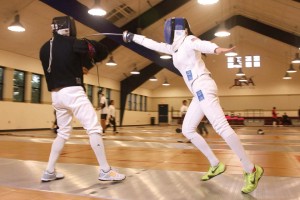 Even with the local fencing history, Moreau must convince fencers that San Antonio is an ideal destination. The majority of NCAA fencing programs are located in the Northeast and Midwest.
Even with the local fencing history, Moreau must convince fencers that San Antonio is an ideal destination. The majority of NCAA fencing programs are located in the Northeast and Midwest.
But Michael Aufrichtig, who coached Columbia University to the NCAA Division I national fencing title this year, said Moreau’s reputation should make the task a little lighter.
“Sure, a lot of schools already have established fencing programs,” Aufrichtig said. “But when he goes out and recruits, he’s going to be able to offer them so much background and experience as an Olympian. Within a few years, he’ll establish a viable program.”
Aufrichtig said when he arrived at Columbia in 2011, he mapped out a four-year plan that came to fruition with this year’s national title. He pointed out that Columbia was the fifth different school to win the title in the last five years.
“The general consensus in the fencing world is one of excitement for the Incarnate Word program,” he said. “Sure it’s more competition, but it just points to a rise in the level of competition. It used to be that everyone’s goal was to qualify for the Olympics. Now the goal is to win. And John (Moreau) will be able to recruit from that growth of competitors.”
UIW Athletics Director John Williams said because of the lack of fencing programs in close proximity, travel for the team will be a challenge, but does not detract from the excitement of adding to the university’s stable of sports, which now with fencing stands at 23 men’s and women’s sports.
“I wasn’t here when they started the program,” Williams said. “But this is going to spread our brand even more. Sure, it’s a challenge. You have to start somewhere, but we have a very good coach who is going to take this program forward.”
Moreau is thinking big and beyond the Cardinals fencing team, with a planned program at St. Anthony Catholic High School and community fencing programs for underprivileged children.
“I have too much to give back to the world,” Moreau said. “I have a love for the sport and I want to give them a love for fencing.”
For more information on the fencing program, contact Moreau at [email protected]
FENCING
WEAPONS
101
Foil: a light thrusting weapon that targets the torso (including the back), neck, and groin, but not the arms or legs.
Sabre: a light cutting and thrusting weapon that targets the entire body above the waist, except the weapon hand.
Epée: a thrusting weapon like the foil, but much heavier. In epée, the entire body is a valid target.

